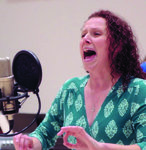

String quartets are so 19th century. Saxophone quartets are the room-swelling, bone-buzzing, shape-shifting vehicle of choice for many of the 21st century’s most vital and compelling composers.
Virtuosic, Chicago-based saxophone quartet Nois, featuring Michigan State University alumni Jordan Lulloff and Julian Velasco, is blowing into town this week for a spectacular demonstration.
Friday, they’ll join MSU’s Wind Symphony for a tornado-inside-a-cyclone concerto. Monday, the quartet takes the stage with the adventurous new music ensemble Musique 21 in a tricky, treat-filled Holloween concert featuring fabulous singer-composer Annika Socolofsky’s “I Tell You Me.”
Nois is not the only saxophone quartet out there, but there is only one Annika Socolofsky. A mesmerizing performer, thinker, feminist and teacher based in Boulder, Colorado, Socolofsky commands up a spine-tingling range of utterances, from guttural growls to ineffable, moth-wing tremors, in a style she calls “avant-folk,” and she’ll be on hand Monday to perform the vocal part herself.
“It’s amazing working with her,” Lulloff said. “It’s pretty unique working with a composer as a performer. You can ask questions and try new things right on the spot.” Socolofsky wrote “I Tell You Me” for Nois in 2019. It’s part of a series of “feminist rager lullabies,” as the composer calls them, in which she reaches into familiar lullabies and nursery rhymes, like so many cute pink jammies, and yanks them inside out, flipping sugar and spice into fire and ice.
Nois and Socolofsky gave the song cycle its world premiere at Chicago’s avant-garde Ear Taxi Festival in October 2021. Out of more than 50 works Nois has premiered since the group formed six years ago, Lulloff said Socolofsky’s music was one of the “two or three most remarkable.”
“She combines lush melodies and harmonies with multiphonics and electronics,” Lulloff said. “It sounds, at times, like there are eight saxophones and four vocalists.”
Monday’s Musique 21 concert continues Nois’s fruitful collaboration with Brooklyn-based, New Zealand-born composer Gemma Peacocke, which began “way back in 2018,” as Lulloff put it.
“Dwalm,” a haunting and sneakily dense meditation Peacocke wrote for Nois, hit a nerve with audiences and has become a widespread favorite in the saxophone quartet world.
“We performed it about 60 or 70 times,” Lulloff said. Feeling that the piece had “run its course,” Nois asked Peacocke for something new, and she came up with “Hazel,” also on Monday’s Musique 21 slate.
Nois premiered “Hazel” at Princeton University, where Peacocke is studying, in April 2022 and played it again two months later at the Bang on a Can Long Play Festival in Brooklyn. Monday’s performance will be the third.
“It’s been a very rewarding collaboration,” Lulloff said.
“Severance,” an ambitious concerto for sax q u a r t e t and wind symphony, is altogether different in scale, s o u n d and conception. The concerto will be the centerpiece of an all-American concert by MSU’s wind symphony Friday.
MSU composition Professor David Biedenbender’s expressive and dramatic music has thrilled local audiences since he came to the area in 2016, most notably in a stupendous trombone concerto premiered by the Lansing Symphony and Ava Ordman in 2018.
The composer was thrilled when the U.S. Navy Band asked him to write a concerto for its saxophone quartet and wind symphony in 2020 to celebrate an international saxophone symposium in Washington, D.C.
Lulloff was in the audience.
“It blew me away,” he said. “I instantly knew that Nois just had to do it.”
Concertos that swirl a sonorous saxophone quartet into the even bigger maelstrom of a wind band are a bit of a thing these days.
The combination is unfamiliar to the mass of musical civilians, but it’s a saxed-up take on one of the most vener-able and familiar musical forms — the concerto grosso, in which small groups of players bounce their melodies off a larger group.
When Ann Arbor composer William Bolcom wrote a concerto for Ann Ar-bor’s Prism sax quartet, he straight up called it “Concerto Grosso for Saxophone Quartet and Band.”
Biedenbender’s concerto, “Severance,” is based on an unusual and compelling 2019 collection of poetry by Central Michigan University Professor Robert Fanning.
Both the book and the concerto come up with highly personal and artistically original ways to express grief.
As the music unfolds, the sax quartet rises out of a mass of nebulous sounds from the surrounding winds, evoking the mysteries of love and memory.
In 2019, Biedenbender lost a close friend and early champion of his music, the vital and passionate Filipino-American pianist Jovanni De Pedro, who died suddenly at age 38.
“Sometimes you see things like this coming, but this was like — the phone call took my breath away,” he said. “Every Way Through Hurts,” the second part of the concerto, features a prominent piano part that evokes De Pedro’s bright spirit. The third and last movement starts with the sax quartet wrestling with jagged, dark forces, but then it gets “groovy and fun,” according to Biedenbender.
The orchestration is “epic, amazing and extraordinary,” in Lulloff ’s description, as a “monster rumble” from the baritone sax generates a towering harmonic ascent. In the run-up to the climax, each member of Nois is pushed to the limit.
“They’re not getting paid by the note,” Bieden-bender said.
“But if they were, they’d make a lot of money.”
Support City Pulse - Donate Today!
Comments
No comments on this item Please log in to comment by clicking here